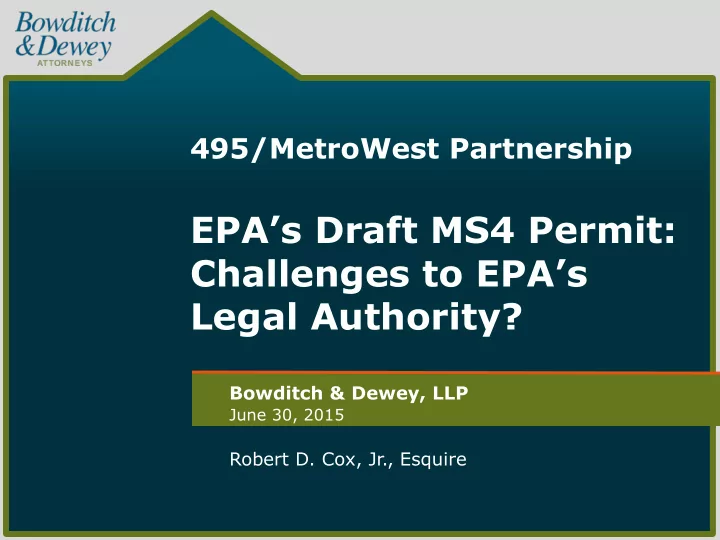

495/MetroWest Partnership EPA’s Draft MS4 Permit: Challenges to EPA’s Legal Authority? Bowditch & Dewey, LLP June 30, 2015 Robert D. Cox, Jr., Esquire
Massachusetts 2014 Draft MS4 Permit • 2008 and 2013 Draft MS4 General Permit for NH • 2010 Massachusetts North Coast and Interstate, Merrimac and South Coastal Draft MS4 General Permit • 9/24/14 Draft Massachusetts Small MS4 General Permit • 2/27/15 – Comment period closed 2
Massachusetts Draft MS4 Jeopardy • What is? – 1753 – 156 – 69 3
Draft MS4 Comments 4
General Nature of Comments • Costs and effect on communities • Harmonizing with Massachusetts Stormwater Standards • Timing and an adaptive Schedule • Outreach materials and tools 5
MassDEP Comments Include EPA is moving away from BMP-based program to new • “water quality based effluent limitations” “MassDEP requests that EPA clarify that MS4 • dischargers must meet water quality based effluent limitations provisions . . . to the maximum extent practicable, and also acknowledge feasibility and costs to achieve those reductions as part of that standard.” 6
What does the Draft Permit Say About Meeting Water Quality Based Effluent Limitations? (WQBEL)? 7
What Does the Fact Sheet Say About Meeting WQBELS? 8
What Does Section 402(p)(3)(B)(iii) Say? Clean Water Act, Section 402: National Pollutant Discharge Elimination System . . . (p) Municipal and industrial stormwater discharges . . . (3) Permit requirements (A) Industrial discharges Permits for discharges associated with industrial activity shall meet all applicable provisions of this section and section 1311 of this title. 9
402(p)(3)(B)(iii) (cont’d) (B) Municipal discharge Permits for discharges from municipal storm sewers – . . . (iii) shall require controls to reduce the discharge of pollutants to the maximum extent practicable , including management practices, control techniques and system, design and engineering methods, and such other provisions as the Administrator or the State determines appropriate for the control of each pollutants. 10
What EPA says about 402(p)(3)(B)(iii) “ Section 402(p)(3)(B)(iii) of the CWA also authorizes • EPA to include in an MS4 permit ‘such other provisions as [EPA] determines appropriate for the control of … pollutants’” “This provision forms a basis for imposing water • quality-based effluent limitations (WQBELs). ” (Fact Sheet, p. 4) 11
What EPA Says About 402(p)(3)(B)(iii) (cont’d) • “EPA interprets this latter clause (i.e. “such other provisions as [EPA] determines appropriate for the control of . . . pollutants” at Section 402(p)(3)(B)(iii) of the CWA) to authorize the imposition of water quality based effluent limitations .” (Fact Sheet, p. 16) 12
What EPA Says About 402(p)(3)(B)(iii) (cont’d) “ Congress enacted Section 402(p) of the Clean Water • Act, which requires that “[p] ermits for discharges from municipal storm sewers . . . shall include a requirement to effectively prohibit non-stormwater discharges into the storm sewers; and shall require controls to reduce the discharge of pollutants to the maximum extent practicable . . . and such other provisions as the Administrator . . . determines appropriate for the control of such pollutants.” CWA §§ 402(p)(3)(B)(ii)-(iii ).” (Fact Sheet, p. 3) •
EPA’s Application of 402(p)(3)(B)(iii) 402(p)(3)(B) Municipal discharge Permits for discharges from municipal storm sewers – . . . (ii) shall include a requirement to effectively prohibit non-stormwater discharges into the storm sewers; and (iii) shall require controls to reduce the discharge of pollutants to the maximum extent practicable, including management practices, control techniques and system, design and engineering methods , and such other provisions as the Administrator or the State determines appropriate for the control of each pollutants 14
Defenders of Wildlife v. Browner , 191 F. 2d 1159 (9 th Cir. 1999) • EPA says gives authority to impose WQBELs • What Defenders says about 402(p)(3)(B)(iii) – is not merely silent on whether municipal discharges must comply . . . – replaces requirement of § 1311 with MEP – unambiguously demonstrates Congress did not require municipal storm-sewer discharges comply with § 1311 (b)(1)(c) 15
Preamble to the Phase II Rule • Refers to Defenders • No other explanation 16
CWA History 1972 – CWA directs attain water quality • standards "without regard to the limits of practicality." 1973 – EPA exempts most stormwater discharges • not contaminated by industrial or commercial activity 1979 - NDRC v Costle , 568 F.2d 1369 (D.C. Cir. • 1979) - Strikes down exemption 1979 - 1985 - EPA regulations and litigation • 17
CWA History (cont’d) • 1987 – Congress amends CWA and adopts of "maximum extent practicable” language at 402(p)(3)(B)(iii) – MEP standard modifies CWA Sec. 301(b)(1)(C) – Requirement to ensure compliance with water quality standards – still applicable to industrial stormwater and industrial and municipal wastewater discharge. 18
Recent Stormwater Case law • Maryland DEP v. Anacostia Riverkeeper, Special Appeals Court of Maryland, No. 2199 (April 2, 2015) – MDEP’s challenge to remand - aff’d – MEP for MS4s does not require strict compliance with WQS or inclusion of numeric limits – MEP “relieves municipal systems of the burden to meet specific water quality standards” – But - permit lacks “objective metrics” or “benchmarks” to determine compliance 19
Stormwater Case Law (cont’d) Natural Resources Defense Council, et al. v. New • York State Department of Environmental Conservation , NY Court of Appeals, No. 48 (May 5, 2015) Issue: Public review, and opportunity for public hearing, • on NOI’s/SWMP – treat NOI like application? No Municipal stormwater is unique from other CWA • discharges “(p)’s text and legislative history indicate Congress has in • mind something other than convectional end-of- pipe control techniques and numeric effluent limits .” 20
More MS4 Jeopardy • What is? – 2016 – 509(b)(1) – 120 21
Likely Outcome? • EPA/DEP will work it out? – “Whether MassDEP ultimately adopts and issues the MS4 under the Massachusetts [CLA] will be . . . carefully considered as the terms of the final permit become clearer.” • Individual permits? • Permit appeal? 22
Questions? Robert D. Cox, Jr., Esquire Bowditch & Dewey, LLP rcox@bowditch.com 508-926-3409 23
Recommend
More recommend